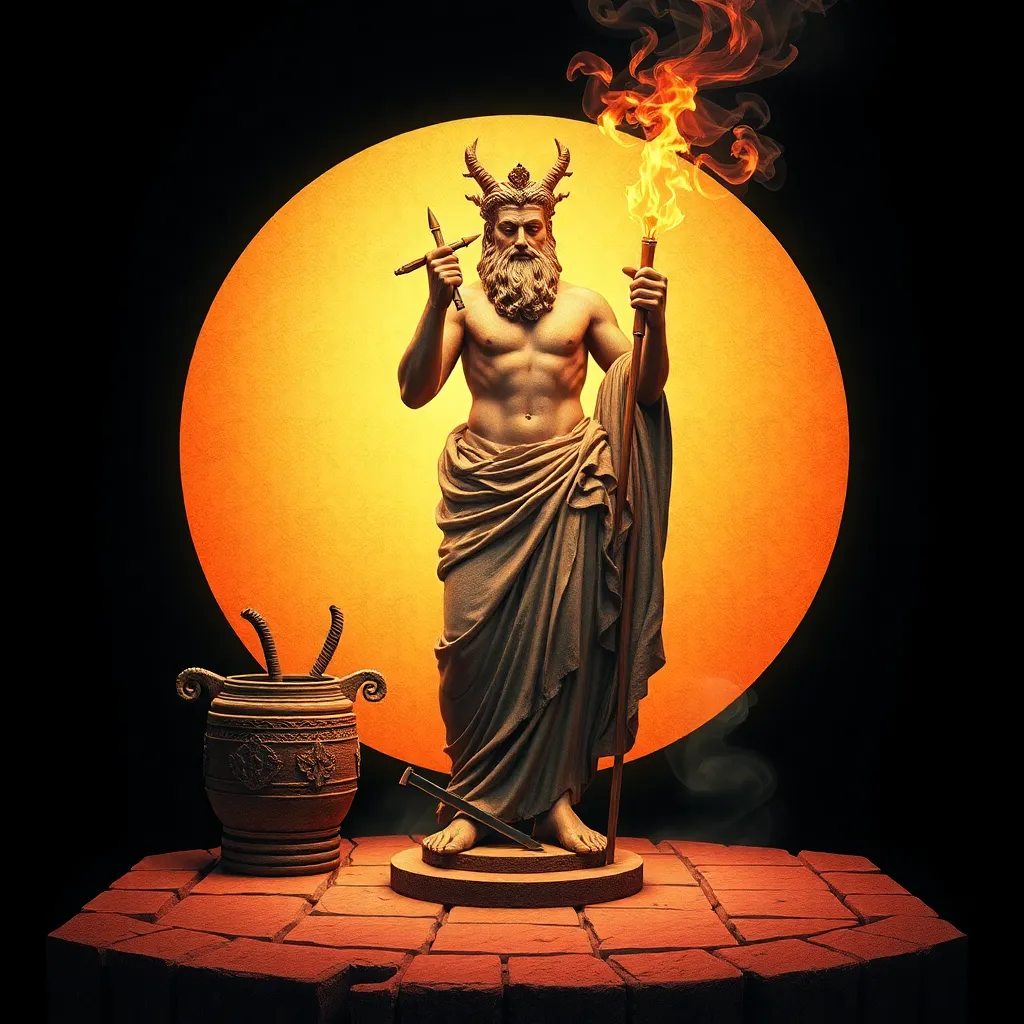Hephaestus and the Concept of Craft: A Philosophical Exploration
I. Introduction
In Greek mythology, Hephaestus is revered as the god of fire and craftsmanship, representing the essence of manual skill and creative ingenuity. He is often depicted as a blacksmith, forging powerful weapons and intricate artifacts for the gods and heroes. His significance transcends mere mythology; Hephaestus embodies the importance of craft in ancient cultures, where artisanship was integral to society’s development and identity.
This article aims to explore the philosophical implications of craft through the lens of Hephaestus, highlighting how the concept of craftsmanship connects to human creativity, ethics, and identity. Through this exploration, we will uncover the enduring relevance of Hephaestus in contemporary society, where the appreciation for craft continues to grow.
II. Hephaestus: The God of Fire and Craftsmanship
A key figure in the pantheon of Greek gods, Hephaestus is the son of Zeus and Hera, though some myths suggest he was born solely of Hera. Unlike his divine counterparts, Hephaestus is often portrayed with physical imperfections, which led to his ostracization from the other gods. However, his unique talents made him indispensable in Olympus.
Hephaestus’s role among the Olympian gods includes crafting magnificent items such as:
- The shield of Achilles
- The chariot of the sun god Helios
- The chains that bound Prometheus
Symbolically, fire represents both destruction and creation. In craftsmanship, fire transforms raw materials into functional and beautiful forms, mirroring the dual nature of creativity itself. Hephaestus embodies this transformative power, illustrating how craft can shape reality through skill and labor.
III. The Nature of Craft: Definitions and Distinctions
To understand the philosophical implications of craft, it is essential to define ‘craft’ in a broader context. Craft can be seen as a skilled practice that involves manual labor, creativity, and a deep understanding of materials. It stands apart from other forms of creative expression in several ways:
- Art: Typically focuses on aesthetic expression and emotional impact.
- Craft: Emphasizes skill, functionality, and the process of making.
- Technology: Involves the application of scientific knowledge to create tools and systems.
The significance of manual labor in craft highlights the value of skill and the human touch in creation. Craftsmanship is not merely about the end product; it encompasses the dedication, effort, and tradition involved in the making process.
IV. Hephaestus as a Metaphor for Human Creativity
Hephaestus serves as a powerful metaphor for human creativity, illustrating the relationship between divine craftsmanship and human endeavor. In mythology, his creations are not just practical tools; they are imbued with meaning, reflecting the depths of human aspiration and imagination.
The act of ‘making’ is fundamental to human identity. From ancient times to the present day, crafting has been a means of expressing individuality and cultural heritage. Hephaestus’s creations inspire us to see the act of making as:
- A source of personal fulfillment
- An exploration of innovation
- A reflection of societal values
Inspiration and innovation are central to craftsmanship, as they drive the evolution of techniques and materials. Hephaestus embodies the intersection of tradition and creativity, reminding us that craftsmanship is an ongoing dialogue between the past and the present.
V. The Ethical Dimensions of Craftsmanship
The act of creation comes with responsibilities and moral implications. Hephaestus, as a creator, illustrates the ethical dimensions of craftsmanship. His work raises important questions, such as:
- What are the consequences of our creations on society?
- How does craftsmanship impact the environment?
- What responsibilities do creators have towards their communities?
As a case study, Hephaestus’s creations often serve both noble and destructive purposes, highlighting the dual nature of craftsmanship. This duality compels us to consider the broader implications of our own creative endeavors and the legacy they leave behind.
VI. The Relationship Between Craft and Identity
Craft is not merely a technical skill; it serves as a means of self-expression and identity formation. For many artisans, the act of creating is intertwined with their personal and cultural identity. Hephaestus’s struggles with acceptance among the gods mirror the challenges faced by individuals who pursue their craft in the face of societal expectations.
The intersection of personal and cultural identity in craftsmanship can be observed in various ways:
- Craft as a means of preserving cultural heritage
- Artisans forging connections with their communities
- The role of craftsmanship in expressing individuality
Hephaestus’s journey reflects the importance of embracing one’s identity, regardless of external perceptions. His legacy encourages us to celebrate our unique contributions to the world through craft.
VII. Contemporary Relevance of Hephaestus and Craft
In modern society, there has been a resurgence of interest in craft, as people seek authenticity and personal connection in their creations. The implications for contemporary artists, artisans, and makers are profound:
- An emphasis on handmade and artisanal goods
- A reaction against mass production and digital culture
- The revival of traditional crafts and skills
Craft serves as a response to the impersonal nature of mass production, inviting individuals to re-engage with the material world and their creative instincts. Hephaestus embodies this movement, encouraging us to find value in the tactile and the handmade.
VIII. Conclusion
In exploring the philosophical significance of Hephaestus and the concept of craft, we uncover a rich tapestry of ideas relating to creativity, ethics, and identity. Hephaestus serves as a timeless symbol of the transformative power of craftsmanship, reminding us of the importance of skill and the human touch in creation.
As we reflect on the key points discussed, it becomes clear that engaging with craft is not merely a pastime; it is a vital part of our human experience. Let us appreciate and celebrate the craft in our everyday lives, drawing inspiration from the legacy of Hephaestus and the artisans who continue to shape our world.




